External Business Report: UK Economy and Hospitality Sector Analysis
VerifiedAdded on 2020/01/15
|12
|5466
|278
Report
AI Summary
This report provides a comprehensive analysis of the external business environment affecting the UK hospitality sector, with a specific focus on Hilton Hotels and Resorts. The report is structured into three tasks, starting with a PowerPoint presentation that examines the structure and operation of the UK economy, analyzes current government economic policies, and assesses demographic trends influencing employment patterns. The second task explores the impact of local government, the EU, and pressure groups on the hotel group's operations, along with an analysis of the UK's legal framework. The final task delves into the different types of businesses within the sector, the legal processes for company formation, and the structure of responsibilities within a registered company. The report considers factors such as income distribution, employment, social structures, and the influence of the EU, providing a detailed overview of the external factors impacting the hotel's operations and strategic decisions within the UK.
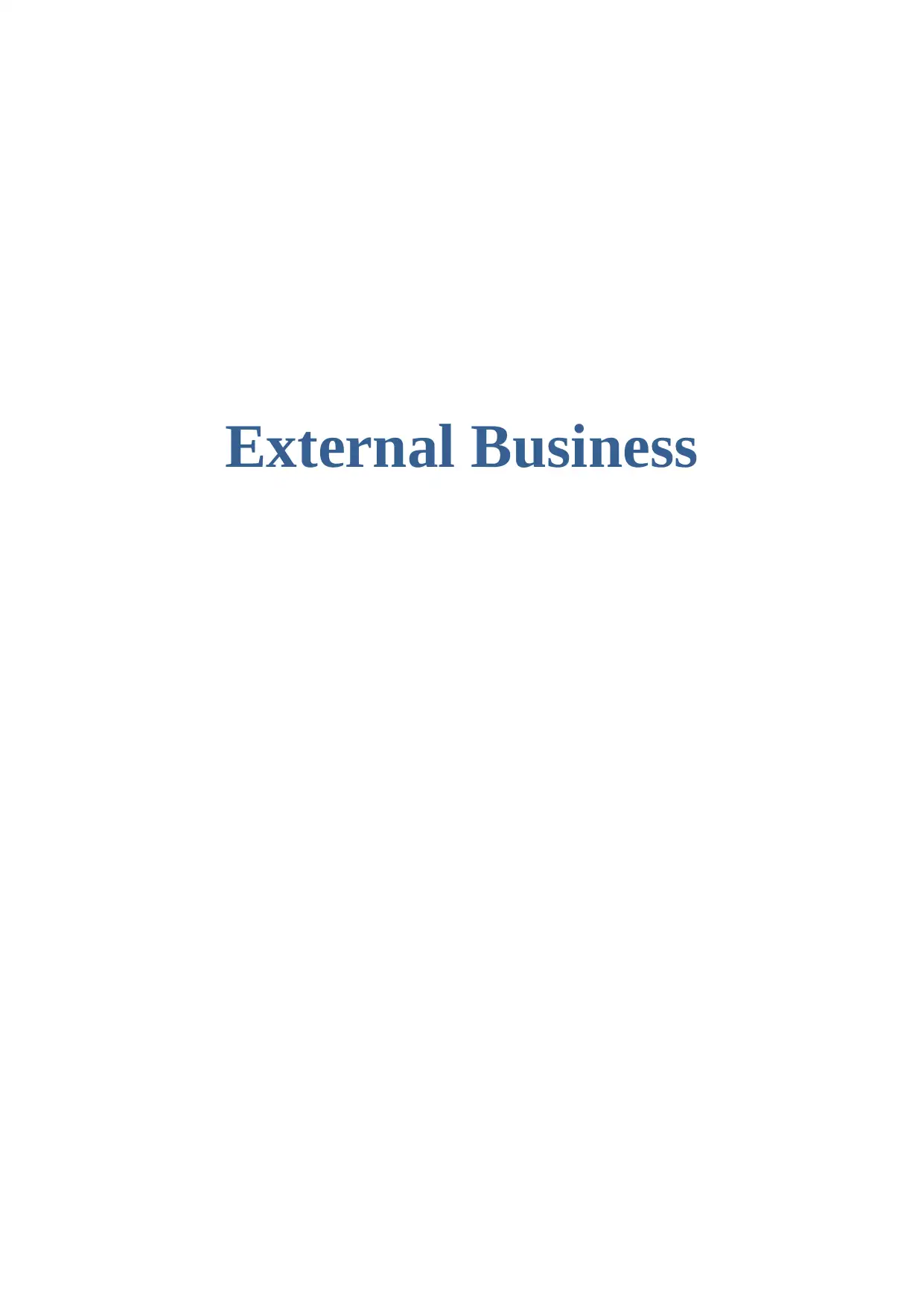
External Business
Paraphrase This Document
Need a fresh take? Get an instant paraphrase of this document with our AI Paraphraser
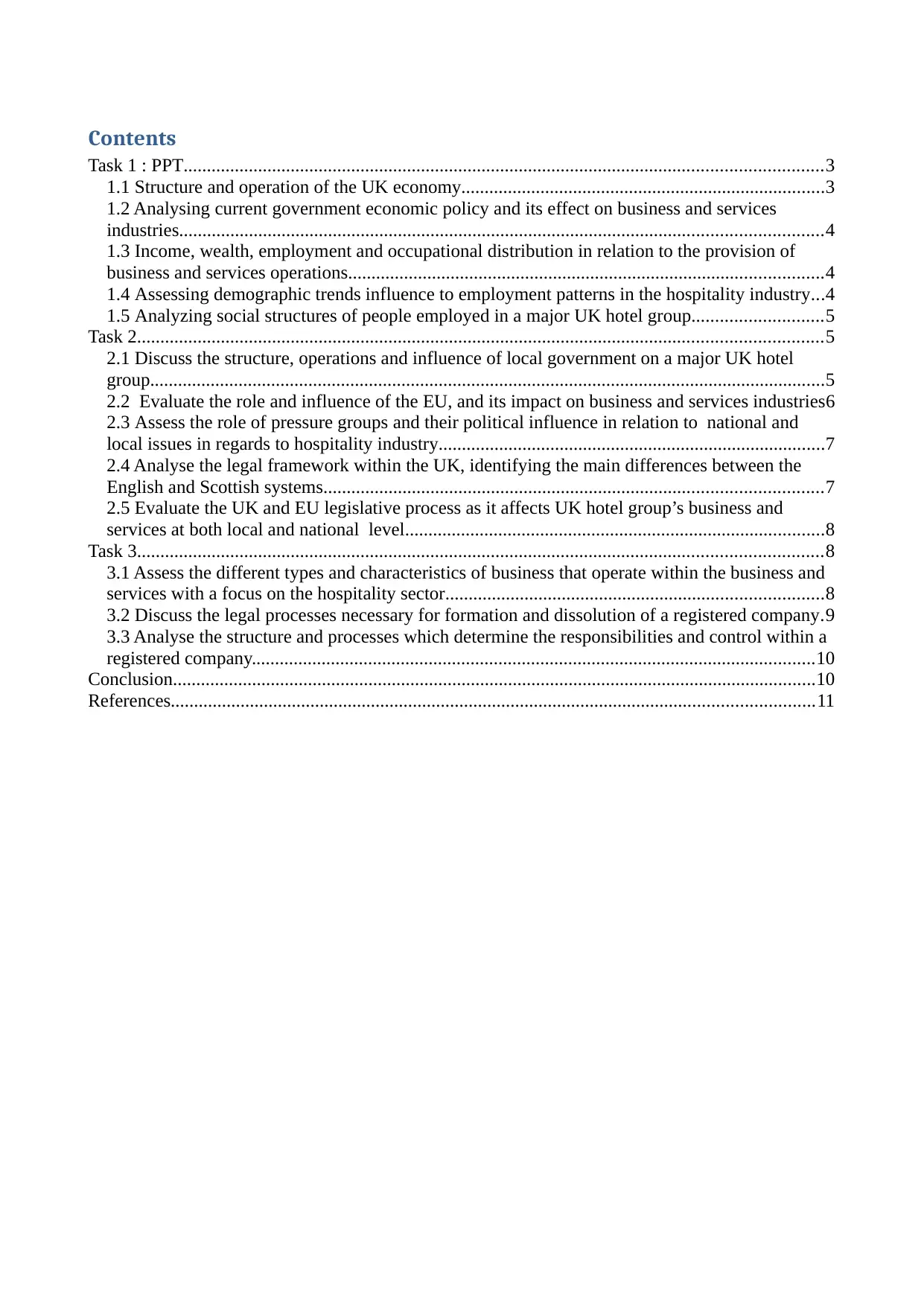
Contents
Task 1 : PPT.........................................................................................................................................3
1.1 Structure and operation of the UK economy..............................................................................3
1.2 Analysing current government economic policy and its effect on business and services
industries..........................................................................................................................................4
1.3 Income, wealth, employment and occupational distribution in relation to the provision of
business and services operations......................................................................................................4
1.4 Assessing demographic trends influence to employment patterns in the hospitality industry...4
1.5 Analyzing social structures of people employed in a major UK hotel group............................5
Task 2...................................................................................................................................................5
2.1 Discuss the structure, operations and influence of local government on a major UK hotel
group.................................................................................................................................................5
2.2 Evaluate the role and influence of the EU, and its impact on business and services industries6
2.3 Assess the role of pressure groups and their political influence in relation to national and
local issues in regards to hospitality industry...................................................................................7
2.4 Analyse the legal framework within the UK, identifying the main differences between the
English and Scottish systems...........................................................................................................7
2.5 Evaluate the UK and EU legislative process as it affects UK hotel group’s business and
services at both local and national level..........................................................................................8
Task 3...................................................................................................................................................8
3.1 Assess the different types and characteristics of business that operate within the business and
services with a focus on the hospitality sector.................................................................................8
3.2 Discuss the legal processes necessary for formation and dissolution of a registered company.9
3.3 Analyse the structure and processes which determine the responsibilities and control within a
registered company.........................................................................................................................10
Conclusion..........................................................................................................................................10
References..........................................................................................................................................11
Task 1 : PPT.........................................................................................................................................3
1.1 Structure and operation of the UK economy..............................................................................3
1.2 Analysing current government economic policy and its effect on business and services
industries..........................................................................................................................................4
1.3 Income, wealth, employment and occupational distribution in relation to the provision of
business and services operations......................................................................................................4
1.4 Assessing demographic trends influence to employment patterns in the hospitality industry...4
1.5 Analyzing social structures of people employed in a major UK hotel group............................5
Task 2...................................................................................................................................................5
2.1 Discuss the structure, operations and influence of local government on a major UK hotel
group.................................................................................................................................................5
2.2 Evaluate the role and influence of the EU, and its impact on business and services industries6
2.3 Assess the role of pressure groups and their political influence in relation to national and
local issues in regards to hospitality industry...................................................................................7
2.4 Analyse the legal framework within the UK, identifying the main differences between the
English and Scottish systems...........................................................................................................7
2.5 Evaluate the UK and EU legislative process as it affects UK hotel group’s business and
services at both local and national level..........................................................................................8
Task 3...................................................................................................................................................8
3.1 Assess the different types and characteristics of business that operate within the business and
services with a focus on the hospitality sector.................................................................................8
3.2 Discuss the legal processes necessary for formation and dissolution of a registered company.9
3.3 Analyse the structure and processes which determine the responsibilities and control within a
registered company.........................................................................................................................10
Conclusion..........................................................................................................................................10
References..........................................................................................................................................11
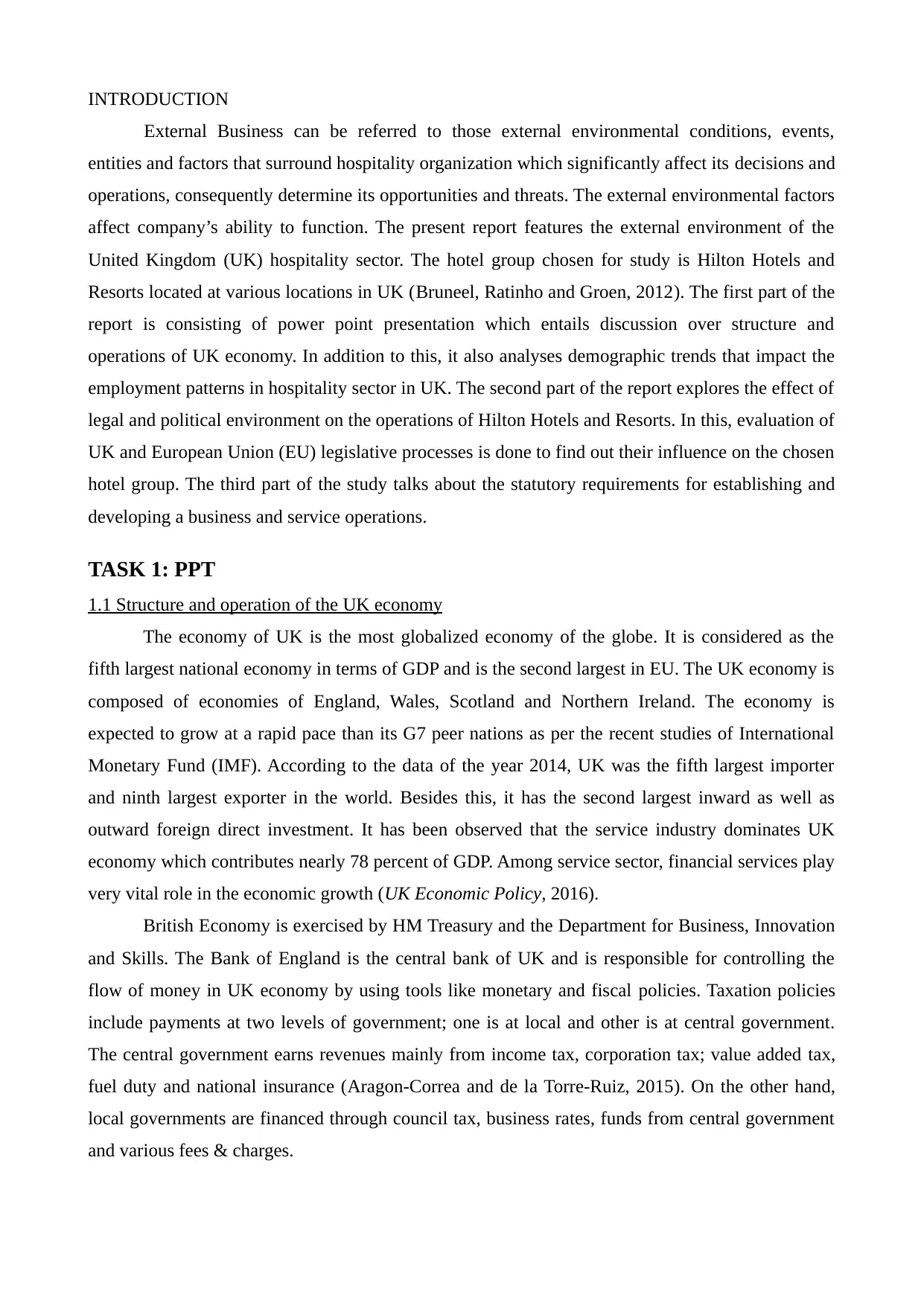
INTRODUCTION
External Business can be referred to those external environmental conditions, events,
entities and factors that surround hospitality organization which significantly affect its decisions and
operations, consequently determine its opportunities and threats. The external environmental factors
affect company’s ability to function. The present report features the external environment of the
United Kingdom (UK) hospitality sector. The hotel group chosen for study is Hilton Hotels and
Resorts located at various locations in UK (Bruneel, Ratinho and Groen, 2012). The first part of the
report is consisting of power point presentation which entails discussion over structure and
operations of UK economy. In addition to this, it also analyses demographic trends that impact the
employment patterns in hospitality sector in UK. The second part of the report explores the effect of
legal and political environment on the operations of Hilton Hotels and Resorts. In this, evaluation of
UK and European Union (EU) legislative processes is done to find out their influence on the chosen
hotel group. The third part of the study talks about the statutory requirements for establishing and
developing a business and service operations.
TASK 1: PPT
1.1 Structure and operation of the UK economy
The economy of UK is the most globalized economy of the globe. It is considered as the
fifth largest national economy in terms of GDP and is the second largest in EU. The UK economy is
composed of economies of England, Wales, Scotland and Northern Ireland. The economy is
expected to grow at a rapid pace than its G7 peer nations as per the recent studies of International
Monetary Fund (IMF). According to the data of the year 2014, UK was the fifth largest importer
and ninth largest exporter in the world. Besides this, it has the second largest inward as well as
outward foreign direct investment. It has been observed that the service industry dominates UK
economy which contributes nearly 78 percent of GDP. Among service sector, financial services play
very vital role in the economic growth (UK Economic Policy, 2016).
British Economy is exercised by HM Treasury and the Department for Business, Innovation
and Skills. The Bank of England is the central bank of UK and is responsible for controlling the
flow of money in UK economy by using tools like monetary and fiscal policies. Taxation policies
include payments at two levels of government; one is at local and other is at central government.
The central government earns revenues mainly from income tax, corporation tax; value added tax,
fuel duty and national insurance (Aragon-Correa and de la Torre-Ruiz, 2015). On the other hand,
local governments are financed through council tax, business rates, funds from central government
and various fees & charges.
External Business can be referred to those external environmental conditions, events,
entities and factors that surround hospitality organization which significantly affect its decisions and
operations, consequently determine its opportunities and threats. The external environmental factors
affect company’s ability to function. The present report features the external environment of the
United Kingdom (UK) hospitality sector. The hotel group chosen for study is Hilton Hotels and
Resorts located at various locations in UK (Bruneel, Ratinho and Groen, 2012). The first part of the
report is consisting of power point presentation which entails discussion over structure and
operations of UK economy. In addition to this, it also analyses demographic trends that impact the
employment patterns in hospitality sector in UK. The second part of the report explores the effect of
legal and political environment on the operations of Hilton Hotels and Resorts. In this, evaluation of
UK and European Union (EU) legislative processes is done to find out their influence on the chosen
hotel group. The third part of the study talks about the statutory requirements for establishing and
developing a business and service operations.
TASK 1: PPT
1.1 Structure and operation of the UK economy
The economy of UK is the most globalized economy of the globe. It is considered as the
fifth largest national economy in terms of GDP and is the second largest in EU. The UK economy is
composed of economies of England, Wales, Scotland and Northern Ireland. The economy is
expected to grow at a rapid pace than its G7 peer nations as per the recent studies of International
Monetary Fund (IMF). According to the data of the year 2014, UK was the fifth largest importer
and ninth largest exporter in the world. Besides this, it has the second largest inward as well as
outward foreign direct investment. It has been observed that the service industry dominates UK
economy which contributes nearly 78 percent of GDP. Among service sector, financial services play
very vital role in the economic growth (UK Economic Policy, 2016).
British Economy is exercised by HM Treasury and the Department for Business, Innovation
and Skills. The Bank of England is the central bank of UK and is responsible for controlling the
flow of money in UK economy by using tools like monetary and fiscal policies. Taxation policies
include payments at two levels of government; one is at local and other is at central government.
The central government earns revenues mainly from income tax, corporation tax; value added tax,
fuel duty and national insurance (Aragon-Correa and de la Torre-Ruiz, 2015). On the other hand,
local governments are financed through council tax, business rates, funds from central government
and various fees & charges.
⊘ This is a preview!⊘
Do you want full access?
Subscribe today to unlock all pages.

Trusted by 1+ million students worldwide
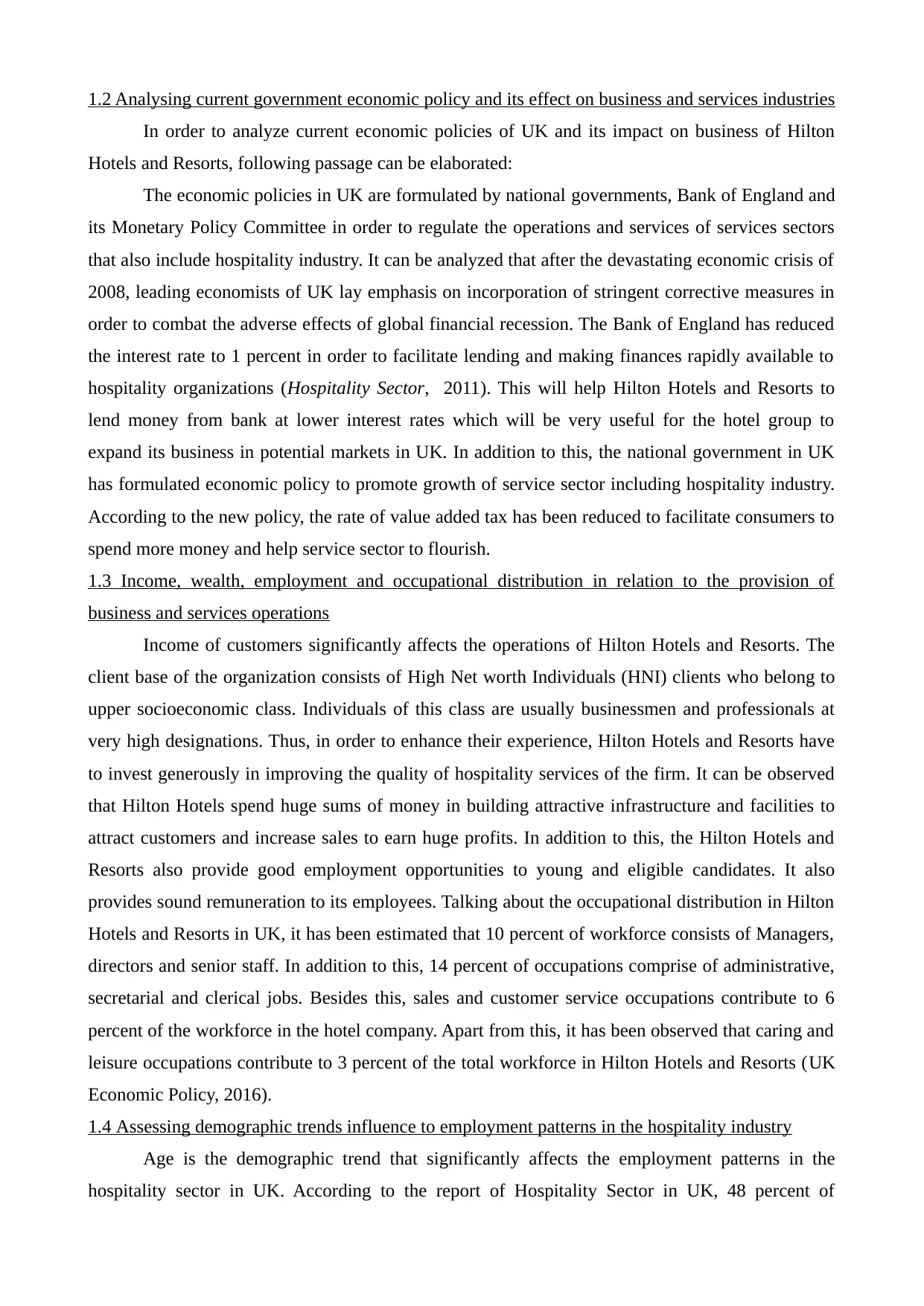
1.2 Analysing current government economic policy and its effect on business and services industries
In order to analyze current economic policies of UK and its impact on business of Hilton
Hotels and Resorts, following passage can be elaborated:
The economic policies in UK are formulated by national governments, Bank of England and
its Monetary Policy Committee in order to regulate the operations and services of services sectors
that also include hospitality industry. It can be analyzed that after the devastating economic crisis of
2008, leading economists of UK lay emphasis on incorporation of stringent corrective measures in
order to combat the adverse effects of global financial recession. The Bank of England has reduced
the interest rate to 1 percent in order to facilitate lending and making finances rapidly available to
hospitality organizations (Hospitality Sector, 2011). This will help Hilton Hotels and Resorts to
lend money from bank at lower interest rates which will be very useful for the hotel group to
expand its business in potential markets in UK. In addition to this, the national government in UK
has formulated economic policy to promote growth of service sector including hospitality industry.
According to the new policy, the rate of value added tax has been reduced to facilitate consumers to
spend more money and help service sector to flourish.
1.3 Income, wealth, employment and occupational distribution in relation to the provision of
business and services operations
Income of customers significantly affects the operations of Hilton Hotels and Resorts. The
client base of the organization consists of High Net worth Individuals (HNI) clients who belong to
upper socioeconomic class. Individuals of this class are usually businessmen and professionals at
very high designations. Thus, in order to enhance their experience, Hilton Hotels and Resorts have
to invest generously in improving the quality of hospitality services of the firm. It can be observed
that Hilton Hotels spend huge sums of money in building attractive infrastructure and facilities to
attract customers and increase sales to earn huge profits. In addition to this, the Hilton Hotels and
Resorts also provide good employment opportunities to young and eligible candidates. It also
provides sound remuneration to its employees. Talking about the occupational distribution in Hilton
Hotels and Resorts in UK, it has been estimated that 10 percent of workforce consists of Managers,
directors and senior staff. In addition to this, 14 percent of occupations comprise of administrative,
secretarial and clerical jobs. Besides this, sales and customer service occupations contribute to 6
percent of the workforce in the hotel company. Apart from this, it has been observed that caring and
leisure occupations contribute to 3 percent of the total workforce in Hilton Hotels and Resorts (UK
Economic Policy, 2016).
1.4 Assessing demographic trends influence to employment patterns in the hospitality industry
Age is the demographic trend that significantly affects the employment patterns in the
hospitality sector in UK. According to the report of Hospitality Sector in UK, 48 percent of
In order to analyze current economic policies of UK and its impact on business of Hilton
Hotels and Resorts, following passage can be elaborated:
The economic policies in UK are formulated by national governments, Bank of England and
its Monetary Policy Committee in order to regulate the operations and services of services sectors
that also include hospitality industry. It can be analyzed that after the devastating economic crisis of
2008, leading economists of UK lay emphasis on incorporation of stringent corrective measures in
order to combat the adverse effects of global financial recession. The Bank of England has reduced
the interest rate to 1 percent in order to facilitate lending and making finances rapidly available to
hospitality organizations (Hospitality Sector, 2011). This will help Hilton Hotels and Resorts to
lend money from bank at lower interest rates which will be very useful for the hotel group to
expand its business in potential markets in UK. In addition to this, the national government in UK
has formulated economic policy to promote growth of service sector including hospitality industry.
According to the new policy, the rate of value added tax has been reduced to facilitate consumers to
spend more money and help service sector to flourish.
1.3 Income, wealth, employment and occupational distribution in relation to the provision of
business and services operations
Income of customers significantly affects the operations of Hilton Hotels and Resorts. The
client base of the organization consists of High Net worth Individuals (HNI) clients who belong to
upper socioeconomic class. Individuals of this class are usually businessmen and professionals at
very high designations. Thus, in order to enhance their experience, Hilton Hotels and Resorts have
to invest generously in improving the quality of hospitality services of the firm. It can be observed
that Hilton Hotels spend huge sums of money in building attractive infrastructure and facilities to
attract customers and increase sales to earn huge profits. In addition to this, the Hilton Hotels and
Resorts also provide good employment opportunities to young and eligible candidates. It also
provides sound remuneration to its employees. Talking about the occupational distribution in Hilton
Hotels and Resorts in UK, it has been estimated that 10 percent of workforce consists of Managers,
directors and senior staff. In addition to this, 14 percent of occupations comprise of administrative,
secretarial and clerical jobs. Besides this, sales and customer service occupations contribute to 6
percent of the workforce in the hotel company. Apart from this, it has been observed that caring and
leisure occupations contribute to 3 percent of the total workforce in Hilton Hotels and Resorts (UK
Economic Policy, 2016).
1.4 Assessing demographic trends influence to employment patterns in the hospitality industry
Age is the demographic trend that significantly affects the employment patterns in the
hospitality sector in UK. According to the report of Hospitality Sector in UK, 48 percent of
Paraphrase This Document
Need a fresh take? Get an instant paraphrase of this document with our AI Paraphraser
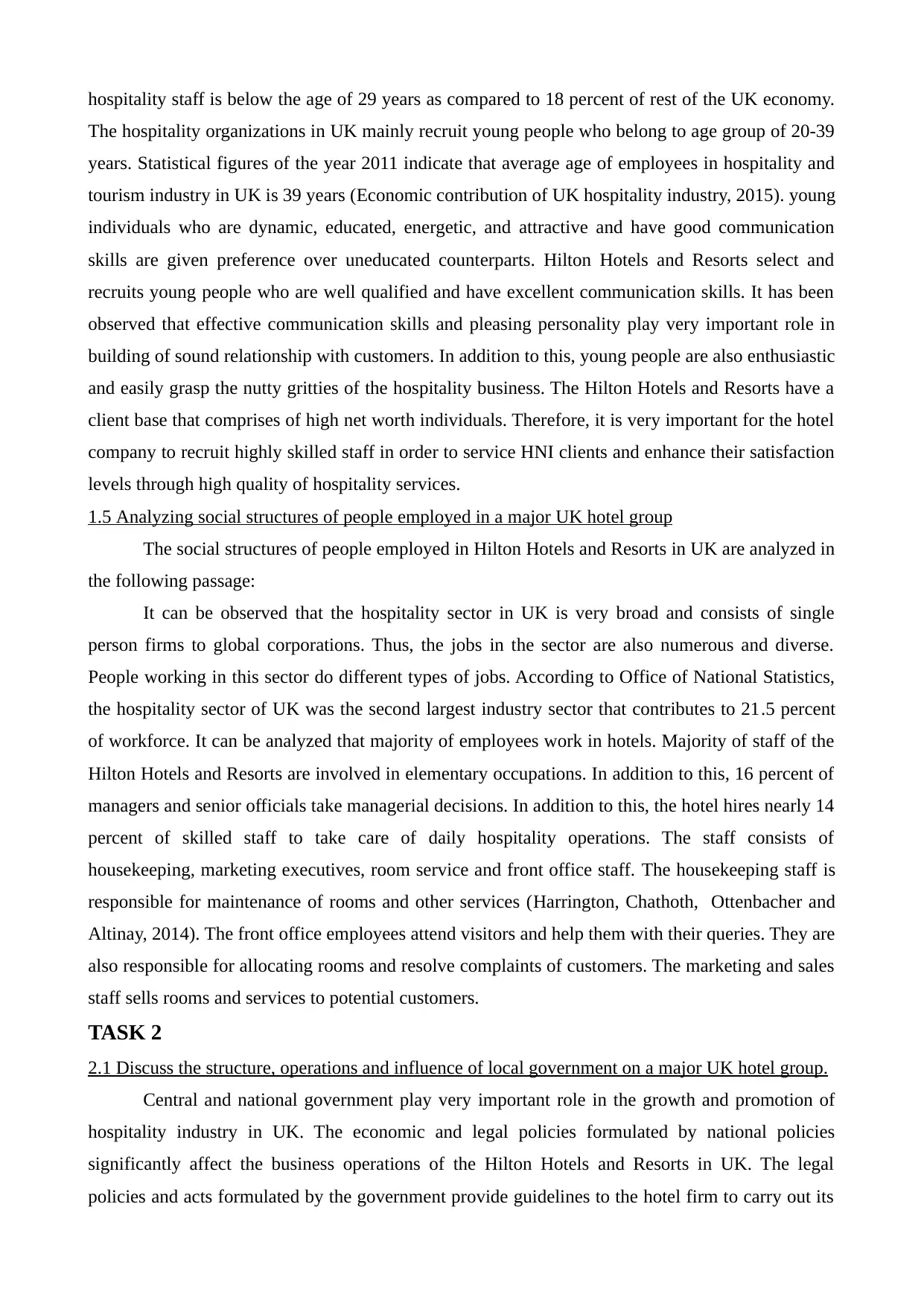
hospitality staff is below the age of 29 years as compared to 18 percent of rest of the UK economy.
The hospitality organizations in UK mainly recruit young people who belong to age group of 20-39
years. Statistical figures of the year 2011 indicate that average age of employees in hospitality and
tourism industry in UK is 39 years (Economic contribution of UK hospitality industry, 2015). young
individuals who are dynamic, educated, energetic, and attractive and have good communication
skills are given preference over uneducated counterparts. Hilton Hotels and Resorts select and
recruits young people who are well qualified and have excellent communication skills. It has been
observed that effective communication skills and pleasing personality play very important role in
building of sound relationship with customers. In addition to this, young people are also enthusiastic
and easily grasp the nutty gritties of the hospitality business. The Hilton Hotels and Resorts have a
client base that comprises of high net worth individuals. Therefore, it is very important for the hotel
company to recruit highly skilled staff in order to service HNI clients and enhance their satisfaction
levels through high quality of hospitality services.
1.5 Analyzing social structures of people employed in a major UK hotel group
The social structures of people employed in Hilton Hotels and Resorts in UK are analyzed in
the following passage:
It can be observed that the hospitality sector in UK is very broad and consists of single
person firms to global corporations. Thus, the jobs in the sector are also numerous and diverse.
People working in this sector do different types of jobs. According to Office of National Statistics,
the hospitality sector of UK was the second largest industry sector that contributes to 21.5 percent
of workforce. It can be analyzed that majority of employees work in hotels. Majority of staff of the
Hilton Hotels and Resorts are involved in elementary occupations. In addition to this, 16 percent of
managers and senior officials take managerial decisions. In addition to this, the hotel hires nearly 14
percent of skilled staff to take care of daily hospitality operations. The staff consists of
housekeeping, marketing executives, room service and front office staff. The housekeeping staff is
responsible for maintenance of rooms and other services (Harrington, Chathoth, Ottenbacher and
Altinay, 2014). The front office employees attend visitors and help them with their queries. They are
also responsible for allocating rooms and resolve complaints of customers. The marketing and sales
staff sells rooms and services to potential customers.
TASK 2
2.1 Discuss the structure, operations and influence of local government on a major UK hotel group.
Central and national government play very important role in the growth and promotion of
hospitality industry in UK. The economic and legal policies formulated by national policies
significantly affect the business operations of the Hilton Hotels and Resorts in UK. The legal
policies and acts formulated by the government provide guidelines to the hotel firm to carry out its
The hospitality organizations in UK mainly recruit young people who belong to age group of 20-39
years. Statistical figures of the year 2011 indicate that average age of employees in hospitality and
tourism industry in UK is 39 years (Economic contribution of UK hospitality industry, 2015). young
individuals who are dynamic, educated, energetic, and attractive and have good communication
skills are given preference over uneducated counterparts. Hilton Hotels and Resorts select and
recruits young people who are well qualified and have excellent communication skills. It has been
observed that effective communication skills and pleasing personality play very important role in
building of sound relationship with customers. In addition to this, young people are also enthusiastic
and easily grasp the nutty gritties of the hospitality business. The Hilton Hotels and Resorts have a
client base that comprises of high net worth individuals. Therefore, it is very important for the hotel
company to recruit highly skilled staff in order to service HNI clients and enhance their satisfaction
levels through high quality of hospitality services.
1.5 Analyzing social structures of people employed in a major UK hotel group
The social structures of people employed in Hilton Hotels and Resorts in UK are analyzed in
the following passage:
It can be observed that the hospitality sector in UK is very broad and consists of single
person firms to global corporations. Thus, the jobs in the sector are also numerous and diverse.
People working in this sector do different types of jobs. According to Office of National Statistics,
the hospitality sector of UK was the second largest industry sector that contributes to 21.5 percent
of workforce. It can be analyzed that majority of employees work in hotels. Majority of staff of the
Hilton Hotels and Resorts are involved in elementary occupations. In addition to this, 16 percent of
managers and senior officials take managerial decisions. In addition to this, the hotel hires nearly 14
percent of skilled staff to take care of daily hospitality operations. The staff consists of
housekeeping, marketing executives, room service and front office staff. The housekeeping staff is
responsible for maintenance of rooms and other services (Harrington, Chathoth, Ottenbacher and
Altinay, 2014). The front office employees attend visitors and help them with their queries. They are
also responsible for allocating rooms and resolve complaints of customers. The marketing and sales
staff sells rooms and services to potential customers.
TASK 2
2.1 Discuss the structure, operations and influence of local government on a major UK hotel group.
Central and national government play very important role in the growth and promotion of
hospitality industry in UK. The economic and legal policies formulated by national policies
significantly affect the business operations of the Hilton Hotels and Resorts in UK. The legal
policies and acts formulated by the government provide guidelines to the hotel firm to carry out its
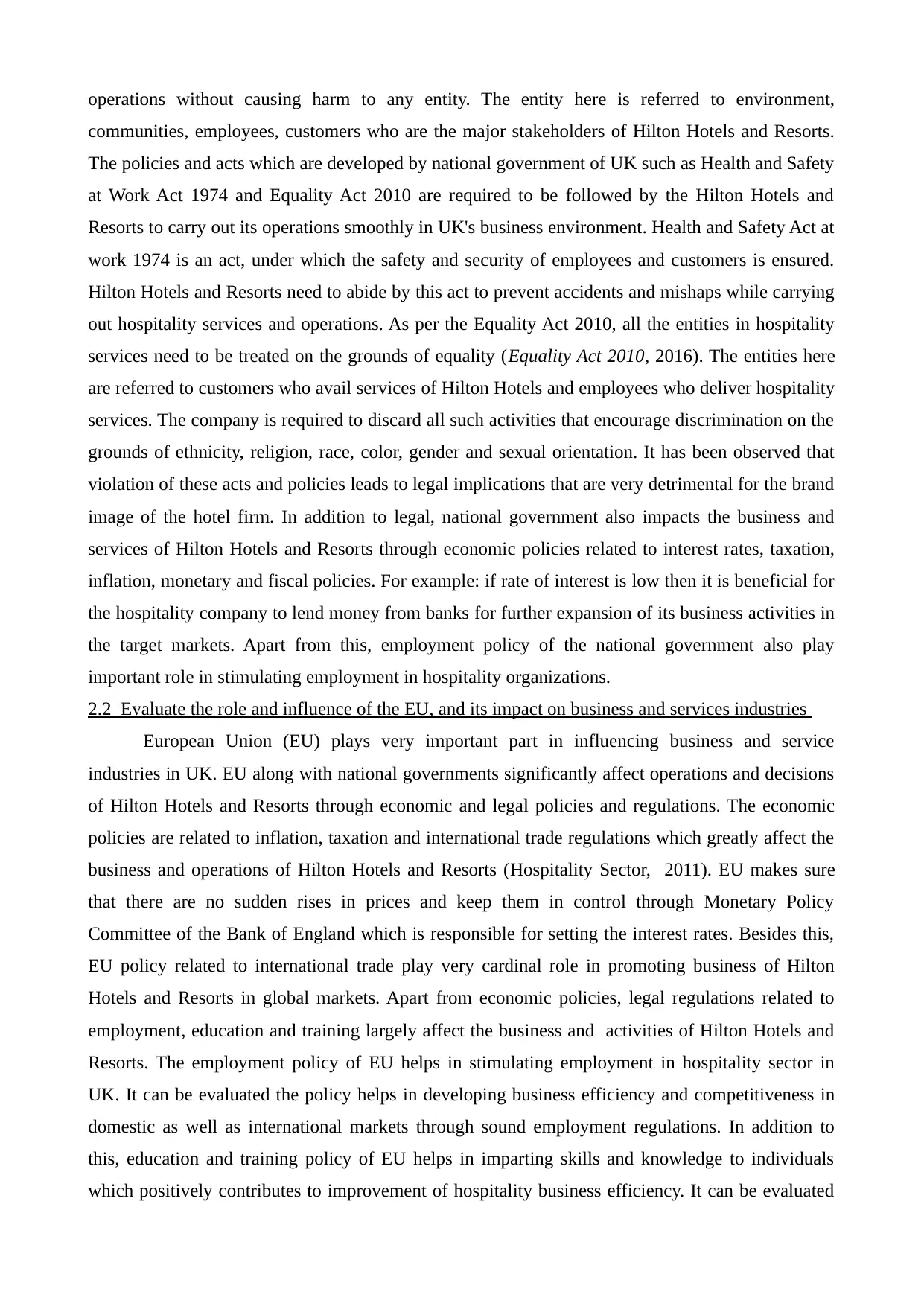
operations without causing harm to any entity. The entity here is referred to environment,
communities, employees, customers who are the major stakeholders of Hilton Hotels and Resorts.
The policies and acts which are developed by national government of UK such as Health and Safety
at Work Act 1974 and Equality Act 2010 are required to be followed by the Hilton Hotels and
Resorts to carry out its operations smoothly in UK's business environment. Health and Safety Act at
work 1974 is an act, under which the safety and security of employees and customers is ensured.
Hilton Hotels and Resorts need to abide by this act to prevent accidents and mishaps while carrying
out hospitality services and operations. As per the Equality Act 2010, all the entities in hospitality
services need to be treated on the grounds of equality (Equality Act 2010, 2016). The entities here
are referred to customers who avail services of Hilton Hotels and employees who deliver hospitality
services. The company is required to discard all such activities that encourage discrimination on the
grounds of ethnicity, religion, race, color, gender and sexual orientation. It has been observed that
violation of these acts and policies leads to legal implications that are very detrimental for the brand
image of the hotel firm. In addition to legal, national government also impacts the business and
services of Hilton Hotels and Resorts through economic policies related to interest rates, taxation,
inflation, monetary and fiscal policies. For example: if rate of interest is low then it is beneficial for
the hospitality company to lend money from banks for further expansion of its business activities in
the target markets. Apart from this, employment policy of the national government also play
important role in stimulating employment in hospitality organizations.
2.2 Evaluate the role and influence of the EU, and its impact on business and services industries
European Union (EU) plays very important part in influencing business and service
industries in UK. EU along with national governments significantly affect operations and decisions
of Hilton Hotels and Resorts through economic and legal policies and regulations. The economic
policies are related to inflation, taxation and international trade regulations which greatly affect the
business and operations of Hilton Hotels and Resorts (Hospitality Sector, 2011). EU makes sure
that there are no sudden rises in prices and keep them in control through Monetary Policy
Committee of the Bank of England which is responsible for setting the interest rates. Besides this,
EU policy related to international trade play very cardinal role in promoting business of Hilton
Hotels and Resorts in global markets. Apart from economic policies, legal regulations related to
employment, education and training largely affect the business and activities of Hilton Hotels and
Resorts. The employment policy of EU helps in stimulating employment in hospitality sector in
UK. It can be evaluated the policy helps in developing business efficiency and competitiveness in
domestic as well as international markets through sound employment regulations. In addition to
this, education and training policy of EU helps in imparting skills and knowledge to individuals
which positively contributes to improvement of hospitality business efficiency. It can be evaluated
communities, employees, customers who are the major stakeholders of Hilton Hotels and Resorts.
The policies and acts which are developed by national government of UK such as Health and Safety
at Work Act 1974 and Equality Act 2010 are required to be followed by the Hilton Hotels and
Resorts to carry out its operations smoothly in UK's business environment. Health and Safety Act at
work 1974 is an act, under which the safety and security of employees and customers is ensured.
Hilton Hotels and Resorts need to abide by this act to prevent accidents and mishaps while carrying
out hospitality services and operations. As per the Equality Act 2010, all the entities in hospitality
services need to be treated on the grounds of equality (Equality Act 2010, 2016). The entities here
are referred to customers who avail services of Hilton Hotels and employees who deliver hospitality
services. The company is required to discard all such activities that encourage discrimination on the
grounds of ethnicity, religion, race, color, gender and sexual orientation. It has been observed that
violation of these acts and policies leads to legal implications that are very detrimental for the brand
image of the hotel firm. In addition to legal, national government also impacts the business and
services of Hilton Hotels and Resorts through economic policies related to interest rates, taxation,
inflation, monetary and fiscal policies. For example: if rate of interest is low then it is beneficial for
the hospitality company to lend money from banks for further expansion of its business activities in
the target markets. Apart from this, employment policy of the national government also play
important role in stimulating employment in hospitality organizations.
2.2 Evaluate the role and influence of the EU, and its impact on business and services industries
European Union (EU) plays very important part in influencing business and service
industries in UK. EU along with national governments significantly affect operations and decisions
of Hilton Hotels and Resorts through economic and legal policies and regulations. The economic
policies are related to inflation, taxation and international trade regulations which greatly affect the
business and operations of Hilton Hotels and Resorts (Hospitality Sector, 2011). EU makes sure
that there are no sudden rises in prices and keep them in control through Monetary Policy
Committee of the Bank of England which is responsible for setting the interest rates. Besides this,
EU policy related to international trade play very cardinal role in promoting business of Hilton
Hotels and Resorts in global markets. Apart from economic policies, legal regulations related to
employment, education and training largely affect the business and activities of Hilton Hotels and
Resorts. The employment policy of EU helps in stimulating employment in hospitality sector in
UK. It can be evaluated the policy helps in developing business efficiency and competitiveness in
domestic as well as international markets through sound employment regulations. In addition to
this, education and training policy of EU helps in imparting skills and knowledge to individuals
which positively contributes to improvement of hospitality business efficiency. It can be evaluated
⊘ This is a preview!⊘
Do you want full access?
Subscribe today to unlock all pages.

Trusted by 1+ million students worldwide
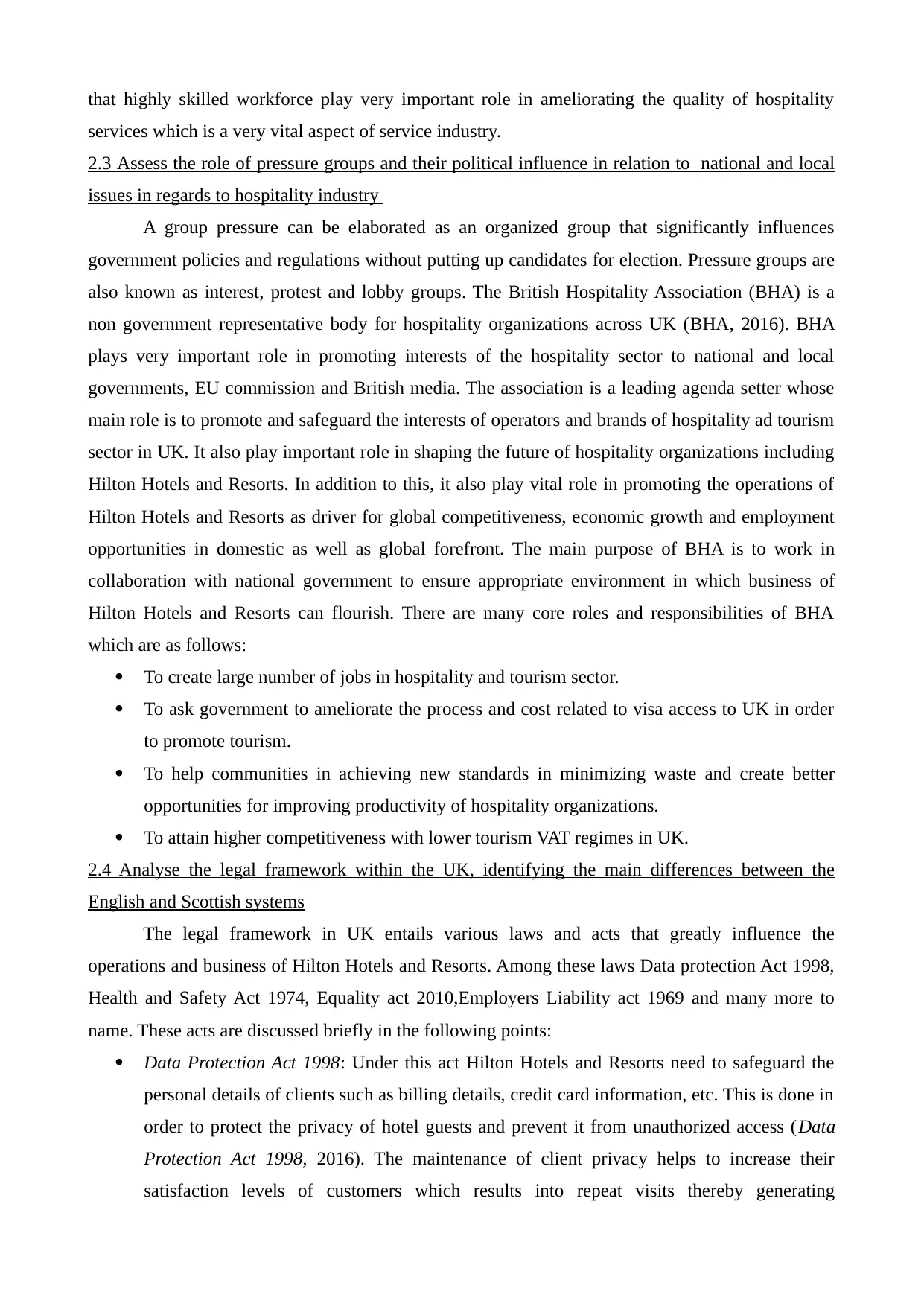
that highly skilled workforce play very important role in ameliorating the quality of hospitality
services which is a very vital aspect of service industry.
2.3 Assess the role of pressure groups and their political influence in relation to national and local
issues in regards to hospitality industry
A group pressure can be elaborated as an organized group that significantly influences
government policies and regulations without putting up candidates for election. Pressure groups are
also known as interest, protest and lobby groups. The British Hospitality Association (BHA) is a
non government representative body for hospitality organizations across UK (BHA, 2016). BHA
plays very important role in promoting interests of the hospitality sector to national and local
governments, EU commission and British media. The association is a leading agenda setter whose
main role is to promote and safeguard the interests of operators and brands of hospitality ad tourism
sector in UK. It also play important role in shaping the future of hospitality organizations including
Hilton Hotels and Resorts. In addition to this, it also play vital role in promoting the operations of
Hilton Hotels and Resorts as driver for global competitiveness, economic growth and employment
opportunities in domestic as well as global forefront. The main purpose of BHA is to work in
collaboration with national government to ensure appropriate environment in which business of
Hilton Hotels and Resorts can flourish. There are many core roles and responsibilities of BHA
which are as follows:
To create large number of jobs in hospitality and tourism sector.
To ask government to ameliorate the process and cost related to visa access to UK in order
to promote tourism.
To help communities in achieving new standards in minimizing waste and create better
opportunities for improving productivity of hospitality organizations.
To attain higher competitiveness with lower tourism VAT regimes in UK.
2.4 Analyse the legal framework within the UK, identifying the main differences between the
English and Scottish systems
The legal framework in UK entails various laws and acts that greatly influence the
operations and business of Hilton Hotels and Resorts. Among these laws Data protection Act 1998,
Health and Safety Act 1974, Equality act 2010,Employers Liability act 1969 and many more to
name. These acts are discussed briefly in the following points:
Data Protection Act 1998: Under this act Hilton Hotels and Resorts need to safeguard the
personal details of clients such as billing details, credit card information, etc. This is done in
order to protect the privacy of hotel guests and prevent it from unauthorized access (Data
Protection Act 1998, 2016). The maintenance of client privacy helps to increase their
satisfaction levels of customers which results into repeat visits thereby generating
services which is a very vital aspect of service industry.
2.3 Assess the role of pressure groups and their political influence in relation to national and local
issues in regards to hospitality industry
A group pressure can be elaborated as an organized group that significantly influences
government policies and regulations without putting up candidates for election. Pressure groups are
also known as interest, protest and lobby groups. The British Hospitality Association (BHA) is a
non government representative body for hospitality organizations across UK (BHA, 2016). BHA
plays very important role in promoting interests of the hospitality sector to national and local
governments, EU commission and British media. The association is a leading agenda setter whose
main role is to promote and safeguard the interests of operators and brands of hospitality ad tourism
sector in UK. It also play important role in shaping the future of hospitality organizations including
Hilton Hotels and Resorts. In addition to this, it also play vital role in promoting the operations of
Hilton Hotels and Resorts as driver for global competitiveness, economic growth and employment
opportunities in domestic as well as global forefront. The main purpose of BHA is to work in
collaboration with national government to ensure appropriate environment in which business of
Hilton Hotels and Resorts can flourish. There are many core roles and responsibilities of BHA
which are as follows:
To create large number of jobs in hospitality and tourism sector.
To ask government to ameliorate the process and cost related to visa access to UK in order
to promote tourism.
To help communities in achieving new standards in minimizing waste and create better
opportunities for improving productivity of hospitality organizations.
To attain higher competitiveness with lower tourism VAT regimes in UK.
2.4 Analyse the legal framework within the UK, identifying the main differences between the
English and Scottish systems
The legal framework in UK entails various laws and acts that greatly influence the
operations and business of Hilton Hotels and Resorts. Among these laws Data protection Act 1998,
Health and Safety Act 1974, Equality act 2010,Employers Liability act 1969 and many more to
name. These acts are discussed briefly in the following points:
Data Protection Act 1998: Under this act Hilton Hotels and Resorts need to safeguard the
personal details of clients such as billing details, credit card information, etc. This is done in
order to protect the privacy of hotel guests and prevent it from unauthorized access (Data
Protection Act 1998, 2016). The maintenance of client privacy helps to increase their
satisfaction levels of customers which results into repeat visits thereby generating
Paraphrase This Document
Need a fresh take? Get an instant paraphrase of this document with our AI Paraphraser
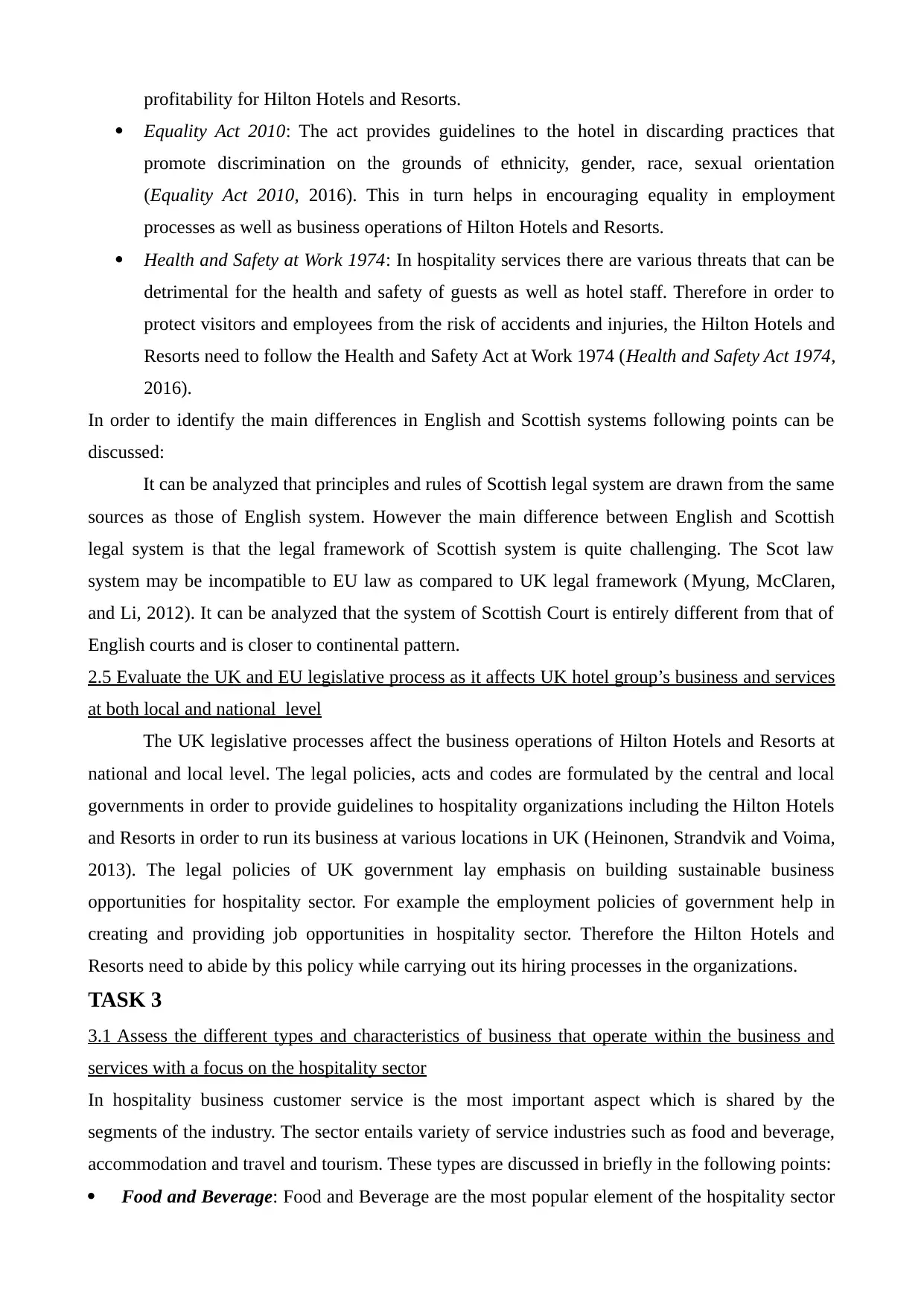
profitability for Hilton Hotels and Resorts.
Equality Act 2010: The act provides guidelines to the hotel in discarding practices that
promote discrimination on the grounds of ethnicity, gender, race, sexual orientation
(Equality Act 2010, 2016). This in turn helps in encouraging equality in employment
processes as well as business operations of Hilton Hotels and Resorts.
Health and Safety at Work 1974: In hospitality services there are various threats that can be
detrimental for the health and safety of guests as well as hotel staff. Therefore in order to
protect visitors and employees from the risk of accidents and injuries, the Hilton Hotels and
Resorts need to follow the Health and Safety Act at Work 1974 (Health and Safety Act 1974,
2016).
In order to identify the main differences in English and Scottish systems following points can be
discussed:
It can be analyzed that principles and rules of Scottish legal system are drawn from the same
sources as those of English system. However the main difference between English and Scottish
legal system is that the legal framework of Scottish system is quite challenging. The Scot law
system may be incompatible to EU law as compared to UK legal framework (Myung, McClaren,
and Li, 2012). It can be analyzed that the system of Scottish Court is entirely different from that of
English courts and is closer to continental pattern.
2.5 Evaluate the UK and EU legislative process as it affects UK hotel group’s business and services
at both local and national level
The UK legislative processes affect the business operations of Hilton Hotels and Resorts at
national and local level. The legal policies, acts and codes are formulated by the central and local
governments in order to provide guidelines to hospitality organizations including the Hilton Hotels
and Resorts in order to run its business at various locations in UK (Heinonen, Strandvik and Voima,
2013). The legal policies of UK government lay emphasis on building sustainable business
opportunities for hospitality sector. For example the employment policies of government help in
creating and providing job opportunities in hospitality sector. Therefore the Hilton Hotels and
Resorts need to abide by this policy while carrying out its hiring processes in the organizations.
TASK 3
3.1 Assess the different types and characteristics of business that operate within the business and
services with a focus on the hospitality sector
In hospitality business customer service is the most important aspect which is shared by the
segments of the industry. The sector entails variety of service industries such as food and beverage,
accommodation and travel and tourism. These types are discussed in briefly in the following points:
Food and Beverage: Food and Beverage are the most popular element of the hospitality sector
Equality Act 2010: The act provides guidelines to the hotel in discarding practices that
promote discrimination on the grounds of ethnicity, gender, race, sexual orientation
(Equality Act 2010, 2016). This in turn helps in encouraging equality in employment
processes as well as business operations of Hilton Hotels and Resorts.
Health and Safety at Work 1974: In hospitality services there are various threats that can be
detrimental for the health and safety of guests as well as hotel staff. Therefore in order to
protect visitors and employees from the risk of accidents and injuries, the Hilton Hotels and
Resorts need to follow the Health and Safety Act at Work 1974 (Health and Safety Act 1974,
2016).
In order to identify the main differences in English and Scottish systems following points can be
discussed:
It can be analyzed that principles and rules of Scottish legal system are drawn from the same
sources as those of English system. However the main difference between English and Scottish
legal system is that the legal framework of Scottish system is quite challenging. The Scot law
system may be incompatible to EU law as compared to UK legal framework (Myung, McClaren,
and Li, 2012). It can be analyzed that the system of Scottish Court is entirely different from that of
English courts and is closer to continental pattern.
2.5 Evaluate the UK and EU legislative process as it affects UK hotel group’s business and services
at both local and national level
The UK legislative processes affect the business operations of Hilton Hotels and Resorts at
national and local level. The legal policies, acts and codes are formulated by the central and local
governments in order to provide guidelines to hospitality organizations including the Hilton Hotels
and Resorts in order to run its business at various locations in UK (Heinonen, Strandvik and Voima,
2013). The legal policies of UK government lay emphasis on building sustainable business
opportunities for hospitality sector. For example the employment policies of government help in
creating and providing job opportunities in hospitality sector. Therefore the Hilton Hotels and
Resorts need to abide by this policy while carrying out its hiring processes in the organizations.
TASK 3
3.1 Assess the different types and characteristics of business that operate within the business and
services with a focus on the hospitality sector
In hospitality business customer service is the most important aspect which is shared by the
segments of the industry. The sector entails variety of service industries such as food and beverage,
accommodation and travel and tourism. These types are discussed in briefly in the following points:
Food and Beverage: Food and Beverage are the most popular element of the hospitality sector
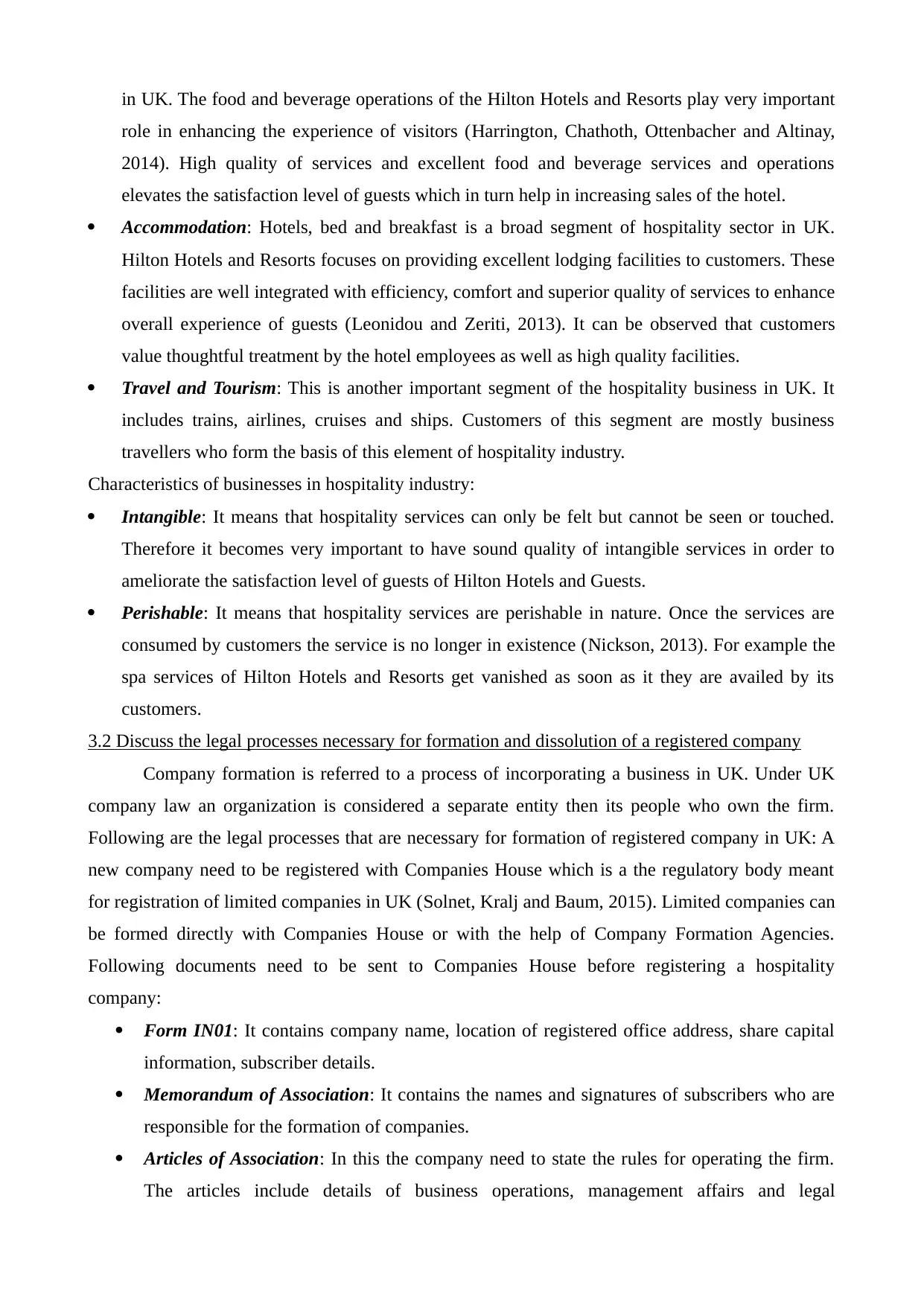
in UK. The food and beverage operations of the Hilton Hotels and Resorts play very important
role in enhancing the experience of visitors (Harrington, Chathoth, Ottenbacher and Altinay,
2014). High quality of services and excellent food and beverage services and operations
elevates the satisfaction level of guests which in turn help in increasing sales of the hotel.
Accommodation: Hotels, bed and breakfast is a broad segment of hospitality sector in UK.
Hilton Hotels and Resorts focuses on providing excellent lodging facilities to customers. These
facilities are well integrated with efficiency, comfort and superior quality of services to enhance
overall experience of guests (Leonidou and Zeriti, 2013). It can be observed that customers
value thoughtful treatment by the hotel employees as well as high quality facilities.
Travel and Tourism: This is another important segment of the hospitality business in UK. It
includes trains, airlines, cruises and ships. Customers of this segment are mostly business
travellers who form the basis of this element of hospitality industry.
Characteristics of businesses in hospitality industry:
Intangible: It means that hospitality services can only be felt but cannot be seen or touched.
Therefore it becomes very important to have sound quality of intangible services in order to
ameliorate the satisfaction level of guests of Hilton Hotels and Guests.
Perishable: It means that hospitality services are perishable in nature. Once the services are
consumed by customers the service is no longer in existence (Nickson, 2013). For example the
spa services of Hilton Hotels and Resorts get vanished as soon as it they are availed by its
customers.
3.2 Discuss the legal processes necessary for formation and dissolution of a registered company
Company formation is referred to a process of incorporating a business in UK. Under UK
company law an organization is considered a separate entity then its people who own the firm.
Following are the legal processes that are necessary for formation of registered company in UK: A
new company need to be registered with Companies House which is a the regulatory body meant
for registration of limited companies in UK (Solnet, Kralj and Baum, 2015). Limited companies can
be formed directly with Companies House or with the help of Company Formation Agencies.
Following documents need to be sent to Companies House before registering a hospitality
company:
Form IN01: It contains company name, location of registered office address, share capital
information, subscriber details.
Memorandum of Association: It contains the names and signatures of subscribers who are
responsible for the formation of companies.
Articles of Association: In this the company need to state the rules for operating the firm.
The articles include details of business operations, management affairs and legal
role in enhancing the experience of visitors (Harrington, Chathoth, Ottenbacher and Altinay,
2014). High quality of services and excellent food and beverage services and operations
elevates the satisfaction level of guests which in turn help in increasing sales of the hotel.
Accommodation: Hotels, bed and breakfast is a broad segment of hospitality sector in UK.
Hilton Hotels and Resorts focuses on providing excellent lodging facilities to customers. These
facilities are well integrated with efficiency, comfort and superior quality of services to enhance
overall experience of guests (Leonidou and Zeriti, 2013). It can be observed that customers
value thoughtful treatment by the hotel employees as well as high quality facilities.
Travel and Tourism: This is another important segment of the hospitality business in UK. It
includes trains, airlines, cruises and ships. Customers of this segment are mostly business
travellers who form the basis of this element of hospitality industry.
Characteristics of businesses in hospitality industry:
Intangible: It means that hospitality services can only be felt but cannot be seen or touched.
Therefore it becomes very important to have sound quality of intangible services in order to
ameliorate the satisfaction level of guests of Hilton Hotels and Guests.
Perishable: It means that hospitality services are perishable in nature. Once the services are
consumed by customers the service is no longer in existence (Nickson, 2013). For example the
spa services of Hilton Hotels and Resorts get vanished as soon as it they are availed by its
customers.
3.2 Discuss the legal processes necessary for formation and dissolution of a registered company
Company formation is referred to a process of incorporating a business in UK. Under UK
company law an organization is considered a separate entity then its people who own the firm.
Following are the legal processes that are necessary for formation of registered company in UK: A
new company need to be registered with Companies House which is a the regulatory body meant
for registration of limited companies in UK (Solnet, Kralj and Baum, 2015). Limited companies can
be formed directly with Companies House or with the help of Company Formation Agencies.
Following documents need to be sent to Companies House before registering a hospitality
company:
Form IN01: It contains company name, location of registered office address, share capital
information, subscriber details.
Memorandum of Association: It contains the names and signatures of subscribers who are
responsible for the formation of companies.
Articles of Association: In this the company need to state the rules for operating the firm.
The articles include details of business operations, management affairs and legal
⊘ This is a preview!⊘
Do you want full access?
Subscribe today to unlock all pages.

Trusted by 1+ million students worldwide
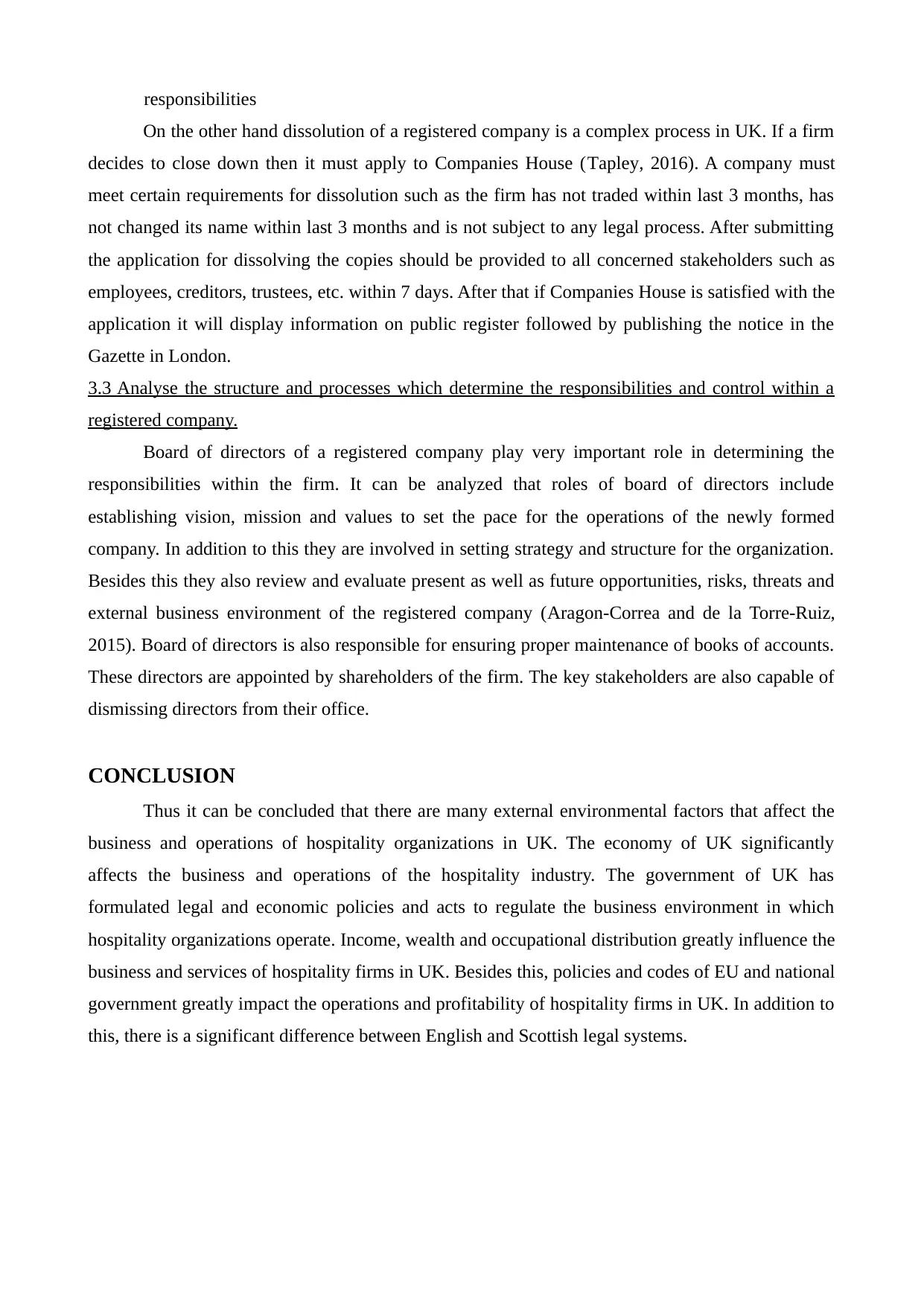
responsibilities
On the other hand dissolution of a registered company is a complex process in UK. If a firm
decides to close down then it must apply to Companies House (Tapley, 2016). A company must
meet certain requirements for dissolution such as the firm has not traded within last 3 months, has
not changed its name within last 3 months and is not subject to any legal process. After submitting
the application for dissolving the copies should be provided to all concerned stakeholders such as
employees, creditors, trustees, etc. within 7 days. After that if Companies House is satisfied with the
application it will display information on public register followed by publishing the notice in the
Gazette in London.
3.3 Analyse the structure and processes which determine the responsibilities and control within a
registered company.
Board of directors of a registered company play very important role in determining the
responsibilities within the firm. It can be analyzed that roles of board of directors include
establishing vision, mission and values to set the pace for the operations of the newly formed
company. In addition to this they are involved in setting strategy and structure for the organization.
Besides this they also review and evaluate present as well as future opportunities, risks, threats and
external business environment of the registered company (Aragon-Correa and de la Torre-Ruiz,
2015). Board of directors is also responsible for ensuring proper maintenance of books of accounts.
These directors are appointed by shareholders of the firm. The key stakeholders are also capable of
dismissing directors from their office.
CONCLUSION
Thus it can be concluded that there are many external environmental factors that affect the
business and operations of hospitality organizations in UK. The economy of UK significantly
affects the business and operations of the hospitality industry. The government of UK has
formulated legal and economic policies and acts to regulate the business environment in which
hospitality organizations operate. Income, wealth and occupational distribution greatly influence the
business and services of hospitality firms in UK. Besides this, policies and codes of EU and national
government greatly impact the operations and profitability of hospitality firms in UK. In addition to
this, there is a significant difference between English and Scottish legal systems.
On the other hand dissolution of a registered company is a complex process in UK. If a firm
decides to close down then it must apply to Companies House (Tapley, 2016). A company must
meet certain requirements for dissolution such as the firm has not traded within last 3 months, has
not changed its name within last 3 months and is not subject to any legal process. After submitting
the application for dissolving the copies should be provided to all concerned stakeholders such as
employees, creditors, trustees, etc. within 7 days. After that if Companies House is satisfied with the
application it will display information on public register followed by publishing the notice in the
Gazette in London.
3.3 Analyse the structure and processes which determine the responsibilities and control within a
registered company.
Board of directors of a registered company play very important role in determining the
responsibilities within the firm. It can be analyzed that roles of board of directors include
establishing vision, mission and values to set the pace for the operations of the newly formed
company. In addition to this they are involved in setting strategy and structure for the organization.
Besides this they also review and evaluate present as well as future opportunities, risks, threats and
external business environment of the registered company (Aragon-Correa and de la Torre-Ruiz,
2015). Board of directors is also responsible for ensuring proper maintenance of books of accounts.
These directors are appointed by shareholders of the firm. The key stakeholders are also capable of
dismissing directors from their office.
CONCLUSION
Thus it can be concluded that there are many external environmental factors that affect the
business and operations of hospitality organizations in UK. The economy of UK significantly
affects the business and operations of the hospitality industry. The government of UK has
formulated legal and economic policies and acts to regulate the business environment in which
hospitality organizations operate. Income, wealth and occupational distribution greatly influence the
business and services of hospitality firms in UK. Besides this, policies and codes of EU and national
government greatly impact the operations and profitability of hospitality firms in UK. In addition to
this, there is a significant difference between English and Scottish legal systems.
Paraphrase This Document
Need a fresh take? Get an instant paraphrase of this document with our AI Paraphraser
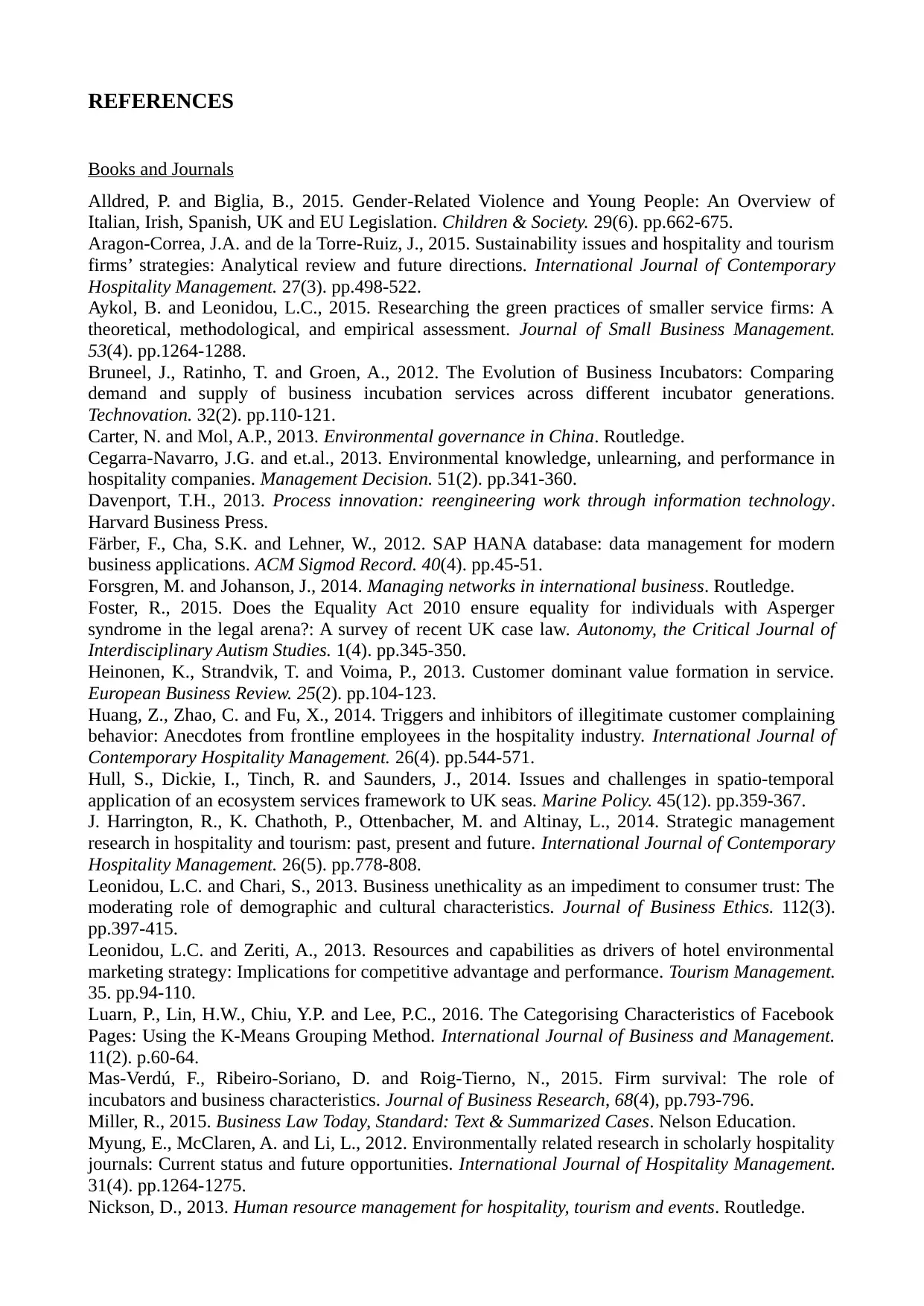
REFERENCES
Books and Journals
Alldred, P. and Biglia, B., 2015. Gender‐Related Violence and Young People: An Overview of
Italian, Irish, Spanish, UK and EU Legislation. Children & Society. 29(6). pp.662-675.
Aragon-Correa, J.A. and de la Torre-Ruiz, J., 2015. Sustainability issues and hospitality and tourism
firms’ strategies: Analytical review and future directions. International Journal of Contemporary
Hospitality Management. 27(3). pp.498-522.
Aykol, B. and Leonidou, L.C., 2015. Researching the green practices of smaller service firms: A
theoretical, methodological, and empirical assessment. Journal of Small Business Management.
53(4). pp.1264-1288.
Bruneel, J., Ratinho, T. and Groen, A., 2012. The Evolution of Business Incubators: Comparing
demand and supply of business incubation services across different incubator generations.
Technovation. 32(2). pp.110-121.
Carter, N. and Mol, A.P., 2013. Environmental governance in China. Routledge.
Cegarra-Navarro, J.G. and et.al., 2013. Environmental knowledge, unlearning, and performance in
hospitality companies. Management Decision. 51(2). pp.341-360.
Davenport, T.H., 2013. Process innovation: reengineering work through information technology.
Harvard Business Press.
Färber, F., Cha, S.K. and Lehner, W., 2012. SAP HANA database: data management for modern
business applications. ACM Sigmod Record. 40(4). pp.45-51.
Forsgren, M. and Johanson, J., 2014. Managing networks in international business. Routledge.
Foster, R., 2015. Does the Equality Act 2010 ensure equality for individuals with Asperger
syndrome in the legal arena?: A survey of recent UK case law. Autonomy, the Critical Journal of
Interdisciplinary Autism Studies. 1(4). pp.345-350.
Heinonen, K., Strandvik, T. and Voima, P., 2013. Customer dominant value formation in service.
European Business Review. 25(2). pp.104-123.
Huang, Z., Zhao, C. and Fu, X., 2014. Triggers and inhibitors of illegitimate customer complaining
behavior: Anecdotes from frontline employees in the hospitality industry. International Journal of
Contemporary Hospitality Management. 26(4). pp.544-571.
Hull, S., Dickie, I., Tinch, R. and Saunders, J., 2014. Issues and challenges in spatio-temporal
application of an ecosystem services framework to UK seas. Marine Policy. 45(12). pp.359-367.
J. Harrington, R., K. Chathoth, P., Ottenbacher, M. and Altinay, L., 2014. Strategic management
research in hospitality and tourism: past, present and future. International Journal of Contemporary
Hospitality Management. 26(5). pp.778-808.
Leonidou, L.C. and Chari, S., 2013. Business unethicality as an impediment to consumer trust: The
moderating role of demographic and cultural characteristics. Journal of Business Ethics. 112(3).
pp.397-415.
Leonidou, L.C. and Zeriti, A., 2013. Resources and capabilities as drivers of hotel environmental
marketing strategy: Implications for competitive advantage and performance. Tourism Management.
35. pp.94-110.
Luarn, P., Lin, H.W., Chiu, Y.P. and Lee, P.C., 2016. The Categorising Characteristics of Facebook
Pages: Using the K-Means Grouping Method. International Journal of Business and Management.
11(2). p.60-64.
Mas-Verdú, F., Ribeiro-Soriano, D. and Roig-Tierno, N., 2015. Firm survival: The role of
incubators and business characteristics. Journal of Business Research, 68(4), pp.793-796.
Miller, R., 2015. Business Law Today, Standard: Text & Summarized Cases. Nelson Education.
Myung, E., McClaren, A. and Li, L., 2012. Environmentally related research in scholarly hospitality
journals: Current status and future opportunities. International Journal of Hospitality Management.
31(4). pp.1264-1275.
Nickson, D., 2013. Human resource management for hospitality, tourism and events. Routledge.
Books and Journals
Alldred, P. and Biglia, B., 2015. Gender‐Related Violence and Young People: An Overview of
Italian, Irish, Spanish, UK and EU Legislation. Children & Society. 29(6). pp.662-675.
Aragon-Correa, J.A. and de la Torre-Ruiz, J., 2015. Sustainability issues and hospitality and tourism
firms’ strategies: Analytical review and future directions. International Journal of Contemporary
Hospitality Management. 27(3). pp.498-522.
Aykol, B. and Leonidou, L.C., 2015. Researching the green practices of smaller service firms: A
theoretical, methodological, and empirical assessment. Journal of Small Business Management.
53(4). pp.1264-1288.
Bruneel, J., Ratinho, T. and Groen, A., 2012. The Evolution of Business Incubators: Comparing
demand and supply of business incubation services across different incubator generations.
Technovation. 32(2). pp.110-121.
Carter, N. and Mol, A.P., 2013. Environmental governance in China. Routledge.
Cegarra-Navarro, J.G. and et.al., 2013. Environmental knowledge, unlearning, and performance in
hospitality companies. Management Decision. 51(2). pp.341-360.
Davenport, T.H., 2013. Process innovation: reengineering work through information technology.
Harvard Business Press.
Färber, F., Cha, S.K. and Lehner, W., 2012. SAP HANA database: data management for modern
business applications. ACM Sigmod Record. 40(4). pp.45-51.
Forsgren, M. and Johanson, J., 2014. Managing networks in international business. Routledge.
Foster, R., 2015. Does the Equality Act 2010 ensure equality for individuals with Asperger
syndrome in the legal arena?: A survey of recent UK case law. Autonomy, the Critical Journal of
Interdisciplinary Autism Studies. 1(4). pp.345-350.
Heinonen, K., Strandvik, T. and Voima, P., 2013. Customer dominant value formation in service.
European Business Review. 25(2). pp.104-123.
Huang, Z., Zhao, C. and Fu, X., 2014. Triggers and inhibitors of illegitimate customer complaining
behavior: Anecdotes from frontline employees in the hospitality industry. International Journal of
Contemporary Hospitality Management. 26(4). pp.544-571.
Hull, S., Dickie, I., Tinch, R. and Saunders, J., 2014. Issues and challenges in spatio-temporal
application of an ecosystem services framework to UK seas. Marine Policy. 45(12). pp.359-367.
J. Harrington, R., K. Chathoth, P., Ottenbacher, M. and Altinay, L., 2014. Strategic management
research in hospitality and tourism: past, present and future. International Journal of Contemporary
Hospitality Management. 26(5). pp.778-808.
Leonidou, L.C. and Chari, S., 2013. Business unethicality as an impediment to consumer trust: The
moderating role of demographic and cultural characteristics. Journal of Business Ethics. 112(3).
pp.397-415.
Leonidou, L.C. and Zeriti, A., 2013. Resources and capabilities as drivers of hotel environmental
marketing strategy: Implications for competitive advantage and performance. Tourism Management.
35. pp.94-110.
Luarn, P., Lin, H.W., Chiu, Y.P. and Lee, P.C., 2016. The Categorising Characteristics of Facebook
Pages: Using the K-Means Grouping Method. International Journal of Business and Management.
11(2). p.60-64.
Mas-Verdú, F., Ribeiro-Soriano, D. and Roig-Tierno, N., 2015. Firm survival: The role of
incubators and business characteristics. Journal of Business Research, 68(4), pp.793-796.
Miller, R., 2015. Business Law Today, Standard: Text & Summarized Cases. Nelson Education.
Myung, E., McClaren, A. and Li, L., 2012. Environmentally related research in scholarly hospitality
journals: Current status and future opportunities. International Journal of Hospitality Management.
31(4). pp.1264-1275.
Nickson, D., 2013. Human resource management for hospitality, tourism and events. Routledge.
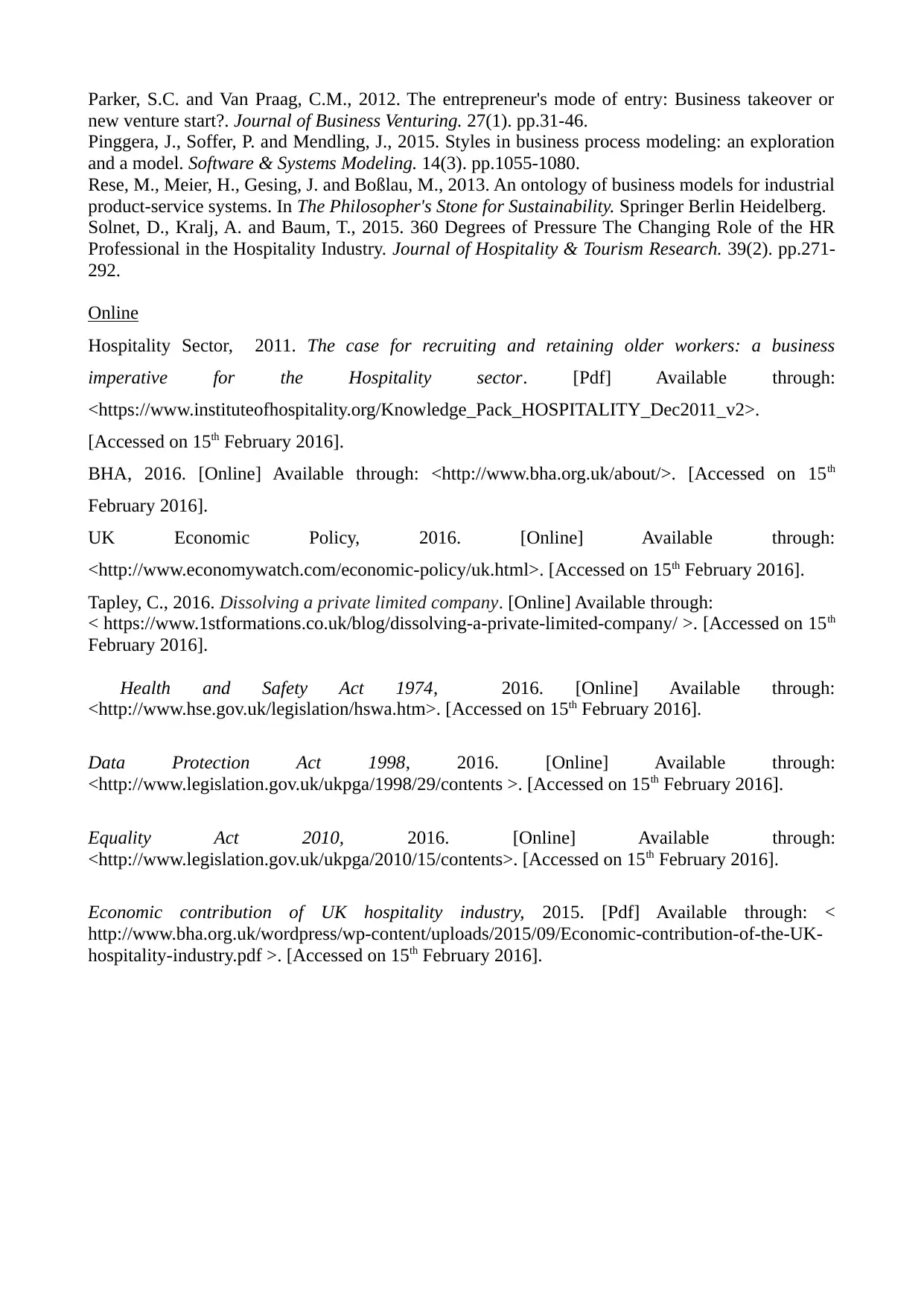
Parker, S.C. and Van Praag, C.M., 2012. The entrepreneur's mode of entry: Business takeover or
new venture start?. Journal of Business Venturing. 27(1). pp.31-46.
Pinggera, J., Soffer, P. and Mendling, J., 2015. Styles in business process modeling: an exploration
and a model. Software & Systems Modeling. 14(3). pp.1055-1080.
Rese, M., Meier, H., Gesing, J. and Boßlau, M., 2013. An ontology of business models for industrial
product-service systems. In The Philosopher's Stone for Sustainability. Springer Berlin Heidelberg.
Solnet, D., Kralj, A. and Baum, T., 2015. 360 Degrees of Pressure The Changing Role of the HR
Professional in the Hospitality Industry. Journal of Hospitality & Tourism Research. 39(2). pp.271-
292.
Online
Hospitality Sector, 2011. The case for recruiting and retaining older workers: a business
imperative for the Hospitality sector. [Pdf] Available through:
<https://www.instituteofhospitality.org/Knowledge_Pack_HOSPITALITY_Dec2011_v2>.
[Accessed on 15th February 2016].
BHA, 2016. [Online] Available through: <http://www.bha.org.uk/about/>. [Accessed on 15th
February 2016].
UK Economic Policy, 2016. [Online] Available through:
<http://www.economywatch.com/economic-policy/uk.html>. [Accessed on 15th February 2016].
Tapley, C., 2016. Dissolving a private limited company. [Online] Available through:
< https://www.1stformations.co.uk/blog/dissolving-a-private-limited-company/ >. [Accessed on 15th
February 2016].
Health and Safety Act 1974, 2016. [Online] Available through:
<http://www.hse.gov.uk/legislation/hswa.htm>. [Accessed on 15th February 2016].
Data Protection Act 1998, 2016. [Online] Available through:
<http://www.legislation.gov.uk/ukpga/1998/29/contents >. [Accessed on 15th February 2016].
Equality Act 2010, 2016. [Online] Available through:
<http://www.legislation.gov.uk/ukpga/2010/15/contents>. [Accessed on 15th February 2016].
Economic contribution of UK hospitality industry, 2015. [Pdf] Available through: <
http://www.bha.org.uk/wordpress/wp-content/uploads/2015/09/Economic-contribution-of-the-UK-
hospitality-industry.pdf >. [Accessed on 15th February 2016].
new venture start?. Journal of Business Venturing. 27(1). pp.31-46.
Pinggera, J., Soffer, P. and Mendling, J., 2015. Styles in business process modeling: an exploration
and a model. Software & Systems Modeling. 14(3). pp.1055-1080.
Rese, M., Meier, H., Gesing, J. and Boßlau, M., 2013. An ontology of business models for industrial
product-service systems. In The Philosopher's Stone for Sustainability. Springer Berlin Heidelberg.
Solnet, D., Kralj, A. and Baum, T., 2015. 360 Degrees of Pressure The Changing Role of the HR
Professional in the Hospitality Industry. Journal of Hospitality & Tourism Research. 39(2). pp.271-
292.
Online
Hospitality Sector, 2011. The case for recruiting and retaining older workers: a business
imperative for the Hospitality sector. [Pdf] Available through:
<https://www.instituteofhospitality.org/Knowledge_Pack_HOSPITALITY_Dec2011_v2>.
[Accessed on 15th February 2016].
BHA, 2016. [Online] Available through: <http://www.bha.org.uk/about/>. [Accessed on 15th
February 2016].
UK Economic Policy, 2016. [Online] Available through:
<http://www.economywatch.com/economic-policy/uk.html>. [Accessed on 15th February 2016].
Tapley, C., 2016. Dissolving a private limited company. [Online] Available through:
< https://www.1stformations.co.uk/blog/dissolving-a-private-limited-company/ >. [Accessed on 15th
February 2016].
Health and Safety Act 1974, 2016. [Online] Available through:
<http://www.hse.gov.uk/legislation/hswa.htm>. [Accessed on 15th February 2016].
Data Protection Act 1998, 2016. [Online] Available through:
<http://www.legislation.gov.uk/ukpga/1998/29/contents >. [Accessed on 15th February 2016].
Equality Act 2010, 2016. [Online] Available through:
<http://www.legislation.gov.uk/ukpga/2010/15/contents>. [Accessed on 15th February 2016].
Economic contribution of UK hospitality industry, 2015. [Pdf] Available through: <
http://www.bha.org.uk/wordpress/wp-content/uploads/2015/09/Economic-contribution-of-the-UK-
hospitality-industry.pdf >. [Accessed on 15th February 2016].
⊘ This is a preview!⊘
Do you want full access?
Subscribe today to unlock all pages.

Trusted by 1+ million students worldwide
1 out of 12
Related Documents
Your All-in-One AI-Powered Toolkit for Academic Success.
+13062052269
info@desklib.com
Available 24*7 on WhatsApp / Email
![[object Object]](/_next/static/media/star-bottom.7253800d.svg)
Unlock your academic potential
Copyright © 2020–2026 A2Z Services. All Rights Reserved. Developed and managed by ZUCOL.





